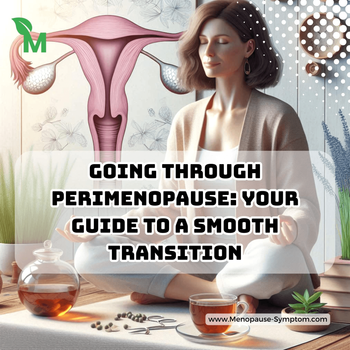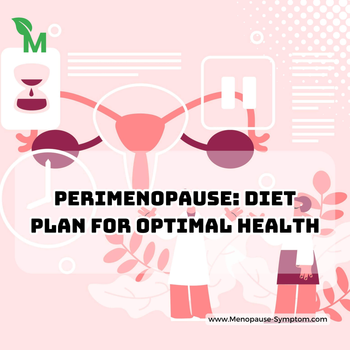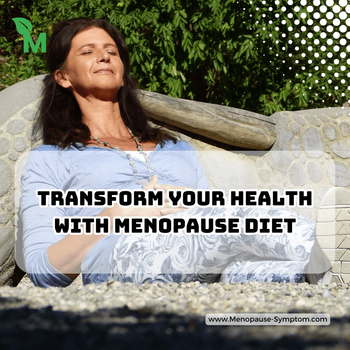During this time, many physiological changes occur, leading to unpleasant symptoms such as hot flashes, insomnia, and mood swings. However, with a reasonable diet, you can effectively minimize these symptoms. This article will give you a clear view of the perimenopause diet, helping you no longer have to guess when taking care of your health.
Understanding Perimenopause
Perimenopause is the transitional period before a woman enters menopause. During this period, estrogen and progesterone hormone levels begin to decrease, causing many unwanted symptoms such as:
· Menstrual disorders: irregular menstruation, sometimes only having a period once every 2-3 months. If your period is irregular for 3 months or more, you should have a medical examination because this may be a gynecological problem that causes menstrual disorders.
· Difficulty getting pregnant: unlike when you were young, it is difficult to get pregnant naturally during this period because the ovaries have problems releasing eggs.
· Hot flashes: women feel hot in the chest, shoulders, neck, face and this condition often lasts 2-3 minutes or longer every day, especially while sleeping.
· Changes in temperament: you are easily angry, anxious, sad, and even depressed.
· Easy to gain weight: metabolism slows down, combined with stress, anxiety, and insomnia, creating conditions for fat to accumulate in the waist, abdomen, thighs, and upper arms.
· Pain: changes in hormone levels lead to osteoarthritis and chest pain.
· Changes in cholesterol levels face the risk of heart disease: the brain-pituitary-ovary axis declines, leading to a decrease in hormones in the body, leading to adverse changes in blood cholesterol levels, increasing the risk of heart disease in women.
· Vaginal dryness: you feel uncomfortable, sore in the genital area, pain during sex due to reduced secretions and elasticity, no longer interested in sex when entering perimenopause.
· Osteoporosis: bone density decreases due to a severe decrease in estrogen levels, leading to faster calcium deficiency, making bones porous, weak, brittle and prone to fracture, causing osteoporosis, osteoarthritis, etc.
· Sleep disorders: hormonal changes make you no longer sleep well, insomnia. You should practice the habit of going to bed early, sleeping on time and consult your doctor.
Therefore, proper nutritional supplementation is extremely important. A suitable premenopausal diet not only helps reduce symptoms but also improves your overall health.
Essential Food Groups
1. Foods Rich in Phytoestrogens
Phytoestrogens are plant-based substances that mimic estrogen in the body. Foods rich in phytoestrogens such as soybeans, flaxseeds, and beans can help regulate hormones and reduce symptoms of menopause. Soybeans are especially helpful, as they are not only rich in protein but also contain many vitamins and minerals.
2. Fruits and Vegetables
Fruits and vegetables are rich in nutrients, providing vitamins, minerals, and antioxidants. Fruits such as apples, strawberries, and oranges are high in fiber and vitamin C, which help boost immunity. Green vegetables such as spinach and broccoli are also important, as they not only help the body detoxify but also help reduce symptoms of menopause.
3. Omega-3s and Healthy Fats
Omega-3s found in salmon, chia seeds, and nuts will help improve heart health and reduce inflammation. Healthy fats like olive oil, avocados, and nuts are also important, as they not only support heart health but also help improve mood, which is important during perimenopause.
4. Whole grains
Whole grains like oats, quinoa, and brown rice provide a good amount of fiber, which helps control weight and stabilize blood sugar. Meanwhile, maintaining an ideal weight will help you minimize the risk of developing perimenopause symptoms.
Practical Eating Tips
1. Divide your meals
Instead of eating three large meals, try dividing them into 5-6 small meals throughout the day. This not only helps your body digest easily but also maintains stable energy, helping you feel more comfortable during perimenopause.
2. Choose natural foods
Stay away from processed foods and foods high in sugar. Instead, prioritize natural, fresh foods. Fresh foods are not only healthy but also less likely to cause weight gain, which is important in managing perimenopause symptoms.
3. Drink enough water
Staying hydrated is essential to help maintain good health and minimize uncomfortable symptoms. Water not only helps the body function well but also supports metabolism.
Nutritional Supplements to Support
In addition to eating a healthy diet during perimenopause, certain nutritional supplements can also help your body. Supplements containing vitamin D and calcium are helpful in promoting bone health during menopause. Melatonin can also help improve sleep, while vitamin B6 can support to improve your mood.
Foods to Avoid
A perimenopause diet should include more than just what you should eat; it should also include what you should avoid. Caffeine, carbonated drinks, alcohol, and too many sweets can all aggravate symptoms like hot flashes and insomnia. Limiting these foods can help you feel more comfortable.
Create Healthy Habits
To maintain an effective perimenopause diet, you need to establish healthy eating habits for yourself. Try to eat with family or friends to create a sense of fun during meals. This will help improve your mood and create a bond with those around you.
Conclusion
A healthy diet during perimenopause is no longer something to be guessed at, but now that you know exactly what to choose for your diet, it will be an important part of taking care of your health. Understanding the necessary food groups, eating tips, and foods to avoid will help you maintain your health and enhance your quality of life during this period. Remember, every body is unique, so listen to your body's needs and adjust your diet to suit yourself. This way, you will feel more confident and ready to face all the changes that perimenopause brings.
Source: Team MPS compiled, analyzed and wrote. Please dont reup without source. Many thanks.

Going Through Perimenopause: Your Guide to a Smooth Transition
Invalid Date
Going through perimenopause can often feel like venturing into uncharted territory, but understanding this transition can help you embrace the changes with confidence.

Perimenopause: Diet Plan For Optimal Health
Invalid Date
Perimenopause is the time when the body begins the natural transition to menopause, marking the end of a woman's reproductive years, usually starting at age 40.

Transform Your Health With Menopause Diet
Invalid Date
